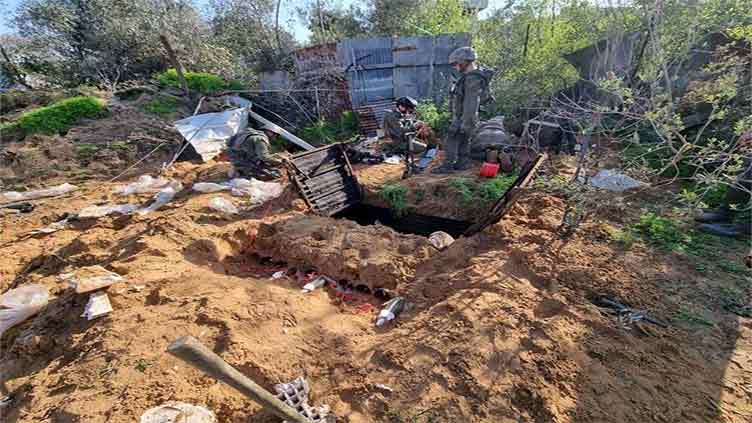Western diplomats seek to prevent Gaza spillover after three months of war

World
Western diplomats seek to prevent Gaza spillover after three months of war
JERUSALEM/AMMAN/CAIRO (Reuters) - Top U.S and European diplomats sought ways on Sunday to keep the Gaza war from spreading further in the volatile Middle East, but three months after the start of the conflict, more bloodshed underlined the difficulties they face.
U.S. Secretary of State Antony Blinken and the European Union's top diplomat, Josep Borrell, were on separate trips to the region to try to quell spillover from the war into Lebanon, the West Bank and Red Sea shipping lanes, where Yemen's Iran-aligned Houthis have vowed to keep up attacks until Israel halts its campaign in the Palestinian enclave.
"We have an intense focus on preventing this conflict from spreading," said Blinken, who was in Jordan on Sunday and will also travel to Israel, the West Bank, Qatar, the United Arab Emirates, Saudi Arabia and Egypt during his fourth trip to the region.
Jordan's King Abdullah urged Blinken to use Washington's influence over Israel to press it for an immediate ceasefire, a palace statement said, warning him of the "catastrophic repercussions" of Israel's continued military campaign.
Despite global concern over the death and destruction in Gaza and international pressure for a ceasefire, Israeli public opinion remains firmly behind the operation aimed at wiping out the Hamas group that rules Gaza, although there has been a big drop in support for Prime Minister Benjamin Netanyahu.
He has not taken responsibility for the security failures that allowed Hamas to attack southern Israel on Oct. 7. But he has vowed to press on with the retaliatory action.
"The war must not be stopped until we achieve all the goals - the elimination of Hamas, the return of all our hostages and ensuring that Gaza will no longer pose a threat to Israel. I say this to both our enemies and our friends," Netanyahu said at the start of a weekly cabinet meeting on Sunday.
Some 1,200 people were killed and 240 were taken hostage on Oct. 7, according to Israeli officials. More than 100 hostages are still believed to be held by Hamas. For Israelis, the deadliest day in the country's history and the accounts of atrocities that later emerged left a sense that the survival of the country is at stake.
Israel's offensive has so far killed 22,835 Palestinians, according to Palestinian health officials on Sunday. Some 113 Palestinians were killed and 250 others were wounded in separate Israeli strikes on Gaza in the past 24 hours, Gaza health ministry spokesman Ashraf Al-Qidra said.
The fighting has displaced most of the enclave's 2.3 million population, with many homes and civilian infrastructure left in ruins amid acute shortages of food, water and medicine.
“We hope that ... Blinken looks at us with an eye of mercy, ends the war, ends the misery we are living in. We are a people that must live a free and dignified life," said one woman, Um Mohamad Al-Arqan, standing by the tent where she is living.
Blinken, who visited Turkey and Greece at the start of his trip, will aim to press hesitant Muslim nations in the region to prepare to play a role in the reconstruction, governance and security of Gaza if and when Israel achieves its goal of eliminating Hamas, said a senior State Department official.
'FIGHTING WILL CONTINUE'
Israeli military spokesperson Rear Admiral Daniel Hagari summarised the offensive on Saturday, saying Israeli forces had completed dismantled Hamas' "military framework" in northern Gaza and had killed around 8,000 militants in that area.
"We are now focused on dismantling Hamas in the centre of and south of the (Gaza) strip," he said in an online briefing.
"Fighting will continue during 2024. We are operating according to a plan to achieve the war's goals, to dismantle Hamas in the north and south," Hagari said.
Palestinian health ministry casualty figures do not differentiate between fighters and civilians, but the ministry has said that 70% of Gaza's dead are women and people under 18.
Gun battles intensified in the southern Gaza town of Khan Younis as well as in districts in the centre of the densely populated Palestinian enclave.
Smoke rose from the sites of Israeli bombing on Sunday morning east and north of Khan Younis. Israeli strikes on houses in Khan Younis killed 50 people, health officials in Nasser Hospital said on Sunday.
Israeli soldiers in the Gaza Strip killed gunmen loading weapons into a vehicle and dismantled a launch site that fired rockets towards Israel, the Israeli military said.
Hamas' armed wing said its fighters destroyed a troop carrier in Al-Maghazi refugee camp in the central Gaza Strip.
Outside Gaza, there was fresh violence in the occupied West Bank.
Israeli aircraft fired on Palestinian militants who had attacked troops in the West Bank, the military said, and Palestinian health officials said seven Palestinians were killed in the strike.
An Israeli border police officer was killed and others wounded when their vehicle was hit by an explosive device during operations in the West Bank city of Jenin, the military and police said.


